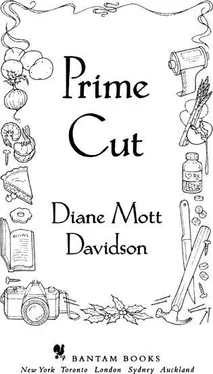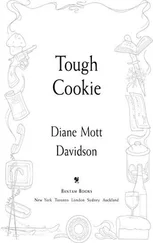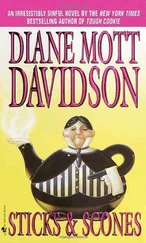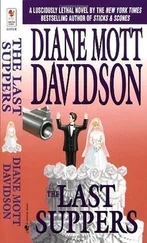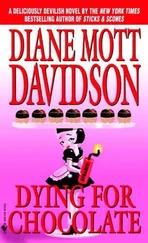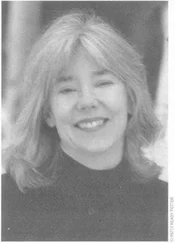I waved at the detritus on the lunchroom table. “But—”
“Go.”
In the office waiting area, Sheila O’Connor talked quietly with Wanda Cooney. Another morgue staff person was shuffling papers and asking Pru questions. Pru, seated next to the desk, mumbled answers. The gist of their conversation had to do with Pru not being able to see and therefore not being able to sign the necessary papers. The papers were being sent on to an attorney. Wanda acknowledged my arrival with a nod, then walked over to attend Pru.
Sheila O’Connor told us: “We’ll release the body for burial in three or four days. There’s a committee at St. Stephen’s Roman Catholic Church in Aspen Meadow that helps with a memorial service or funeral arrangements when the spouse or family can’t.”
Pru’s voice rose, tremulous. “Goldy? Are you there? You were his favorite.”
I went over to Pru’s side and leaned down to embrace her. “Let’s go back to your place. You should be home.”
Sheila motioned me over for a last message. “Tom called. He wanted to know if you’d prefer to wait for him.” When I bit the inside of my lip and didn’t reply, Sheila added, “I promised I’d call him back, if you want to leave right away.”
“Tell him I’ll meet him at home in a couple of hours. Tell him I’ll be fine—not to worry.”
I headed west in Julian’s black Range Rover behind Wanda Cooney’s dull green Suburban. Overhead, the sun shone briefly between mushrooming gray clouds. One of our summer thunderstorms was brewing. The half of my brain still operating logically recalled that the drive to the Blue Spruce condo would take forty-five minutes. Time to focus on Pru, whom I barely knew, despite my long friendship with André.
But I could not. I ground the gears and felt my mind shift from rationality to despair. André dead. It wasn’t possible.
Raindrops spattered across the windshield. The wipers scraped noisily over the glass as the van crested the interstate; the Continental Divide, thickly shrouded in mist, came into view. A heart attack. Two burns .
Tongues of lightning flicked above the near mountains as we turned into Aspen Meadow. At the turnoff to Blue Spruce, I glanced down Main Street. Stupid, unexpected worries about the tasting party the following day loomed. How would I gather supplies? When would I manage to finish the cooking? How could the packing and serving get pulled together? Julian will do it, I told myself. Thank God for Julian.
Water splatted on the glass and I turned on my lights. Beside the road, Cottonwood Creek gushed and foamed. A memory of André trying dinner menus appeared from nowhere. He would always offer the cooking staff dishes laden with possibilities: cranberry-glazed pork with sweet potato pudding; seared steak Hong Kong with creamy risotto; poached Dover sole nestled in steamed artichokes and hollandaise. He would concentrate intently as he drizzled blackberry sauce over a spill of crepes, then have me taste as he meticulously wrote out times for prepping and cooking. He would cap his pen and say, “Now, Goldy. All is well?”
No. All is not well.
I needed information. I needed to know what had happened to him. How it could have happened to him. I picked up my cellular phone and punched in the number for information. When the operator answered I asked for the number for Mountain Taxi. Yes, I replied to the operator’s query; I would like her to connect me.
The taxicab dispatcher’s voice crackled. I identified myself as a cook who worked with André Hibbard, and could I speak with the driver who brought Mr. Hibbard to work this morning? The dispatcher put me on hold. It was unlikely that the police would have questioned the driver already, I figured. If for some reason the sheriff’s department didn’t want me to talk to the driver, then I would have to come up with another strategy.
The line filled with static and then cleared. “Yeah, this is Mike. I took the chef this morning. I’ve been driving him out to that job site. Who’re you again?”
“It’s Goldy Schulz, the caterer. I used to work with André.”
“Yeah, well, I’ve been taking him to work lately. The old guy couldn’t drive. I gotta call here, whaddaya need to know?”
I asked about his schedule this morning. Mike had picked André up at six-thirty, an hour earlier than usual. When I asked why so early, Mike replied, “I don’t know. I ast the chef, What you cooking out there this time of the morning? You already got two big boxes of food. Ain’t you done yet? And he got all huffy, the way he does, you know, and said, Yeah, he was done with the cooking, but that he still had work to do. That was it. Told me he’d call when he was done, the way he usually does, only he didn’t. Did you take him back?”
“No.” I wasn’t going to tell Mike that André was dead; he’d find out soon enough. I forced myself to concentrate on my driving. The Rover hurtled along a winding paved road bordered by a steeply cut cliff. I glanced at the creek and meadow on the right and said, “Was anyone else there? Anyone at all?”
“Nope. The gate was open, and that was what I was worried about, but André had called ahead about that. No cars. I helped him carry the boxes across the creek the way I usually do, then I left.”
“And what was in the boxes?”
“His food and his beaters and whatnot. Why? Some-thin’ wrong?”
“What food? Did he tell you?”
“He told me, but now I can’t remember. Wait … individual custards, he told me. People love ‘em, he said.”
“No fruit to slice, no coffee cake to make?”
“Nope. He’d made muffins to go with the custards. He even gave me one, had orange peel in it. It was good.”
I took a deep breath. “Did you notice his hands? Had he been burned? Did he complain that he’d been burned?”
“I didn’t notice anything wrong with his hands, and he didn’t mention them. What is this about?”
I told Mike it was nothing, thanked him, and signed off. When I’d replaced the cell I gripped the wheel. André had made custards and muffins ahead of time, gone to work early to do unknown extra work, burned himself before or during a coronary attack, and died. Made perfect sense. I wrenched the wheel to the right and turned into the Blue Spruce Retirement Village.
Wanda had Pru settled in her small blue-and-white sitting room. I offered to make tea. The condo was a tribute to Pru’s love of teapots. Every available table, shelf, and cupboard in the sitting room and kitchen was crowded with teapots: fat and gold-rimmed, slender and blue, pink and detailed, new and antique. I’d been in their home only once before, when Pru and André had first moved in and I’d brought over a loaf of oatmeal bread. I veered away from that memory as I found cups, bags of Pru and André’s favorite English Breakfast tea, spoons, lemon slices, sugar, cream, and arranged them on a tray with a plain ivory pot.
“Pru, I want to help,” I said, once I’d served her tea and we were settled in the sitting room on plump blue-and-white slipcovered chairs. Wanda Cooney had excused herself to make phone calls. I told Pru about the church and funeral arrangements. She nodded, sipped from her cup, and smoothed the folds in her pink cashmere skirt. The wall above the couch where she sat was crowded with mounted photos of André: offering a full-size fudge football to a Denver sportscaster, frosting his renowned Stanley Cupcakes for our triumphant Avalanche. I’d later begged for the recipe; of course, he’d given it to me.
“Thank you for the tea,” Pru murmured, her unseeing eyes fixed on her hands, clasped around her fragile teacup.
I took a deep breath; the doorbell bonged. Wanda’s voice murmured into the phone in the next room. When the bell rang again, I rose to answer it.
Читать дальше
